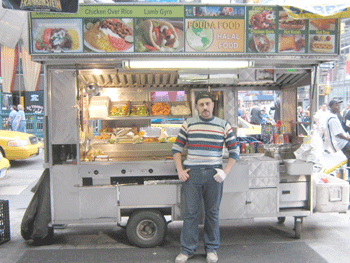
|
| Ahmed Fouda stands in front of his shish kebab cart at the corner of 49th Street and Seventh Avenue in Manhattan. |
NEW YORK — It has not been an easy few weeks for Ahmed Fouda, the owner of Fouda Food, a shish kebab cart permanently parked at the corner of 49th Street and Seventh Avenue in Manhattan, outside of the now bankrupt Lehman Brothers and epicenter of the current economic crisis. Business was down 75 percent after the investment bank went bust two weeks ago, and it remains unsteady.
Even before the collapse of Lehman things were rough. There was the rising price of ingredients and the high cost of the fuel required to heat the grill. And on top of that it was Ramadan, the Muslim period of fasting. Fouda and several of his employees must bury their hunger pangs for upwards of 12 hours at a time while preparing and serving sizzling plates of meat and vegetables.
But Fouda and his chief employee, Samir Elmggar, see relief, if not to the financial crisis, at least to the hunger pangs. Ramadan ends on Tuesday.
“Ramadan is very hard,” said Elmgaar, removing his latex gloves after serving hot dogs to a gaggle of female tourists, “Tuesday, it’s finished.” His cheeks plumped into a smile and his eyes had an anticipatory glint as he described Eid al Fitr, the food and friend-fueled Muslim holiday that immediately follows Ramadan.
The holiday translates literally to “festivity to break the fast” and lasts three days. Both Elmgaar and Fouda will have Wednesday, the first day of Eid, off from work. They will start the day at 6 a.m. with an hour and a half of prayers. In Egypt, this would be followed by a trip to the cemetery with family to say “salam alaikum” to deceased relatives, followed by a large meal. “No tears, happy,” said Fouda of the cemetery visit, stressing that Eid is a joyful holiday. Neither man has family in New York to celebrate the holiday with, so they will celebrate with friends. Elmgaar plans to spend the day in Central Park; Fouda will go out for a meal at a shisha café in Queens.
Fouda came to the U.S. from Egypt six years ago and set up his shish kabob business almost immediately. Elmgaar is also from Egypt, but arrived here just one year ago. Fouda met and recruited him while he was working at another food cart in Queens. Both men won the Green Card Lottery in Egypt, enabling them to work and live in the United States indefinitely.
Thanks to the lunching Lehman Brothers, business had always been steady at Fouda Food. Fouda estimates that he lost 50 regular customers from the investment bank. Several of them came to the cart to say goodbye after losing their jobs. A week ago, sales did not cover Fouda’s overhead and he was forced to pay his employees out of his own pocket. “My stuff is expensive, I’ve got to cover it,” he said.
The huge LCD screens towering over Fouda Food proudly trumpet “Barclay’s Capital” in blue and white pixels. Business has picked back up, partially due to the ever-larger throngs of European tourists the weak dollar is drawing to New York City and due in larger part to the new tenants. New people come in and out of the building, but Fouda is unsure about the situation inside. “The people change everyday, I don’t know why,” Fouda said, shrugging.
When it comes to his cart, Fouda is like a mother hen, never straying far from it and always keeping an eye on his employees. He watched wearily as Elmgaar prepared a heaping portion of beef and liver over rice for him, motioning for more hot sauce and more pita bread. He checked the time. “20 more minutes,” Fouda said, smiling and rocking on his heels, eyes fixed on the two Styrofoam boxes containing his breakfast. Relief was in sight.






Leave a Reply